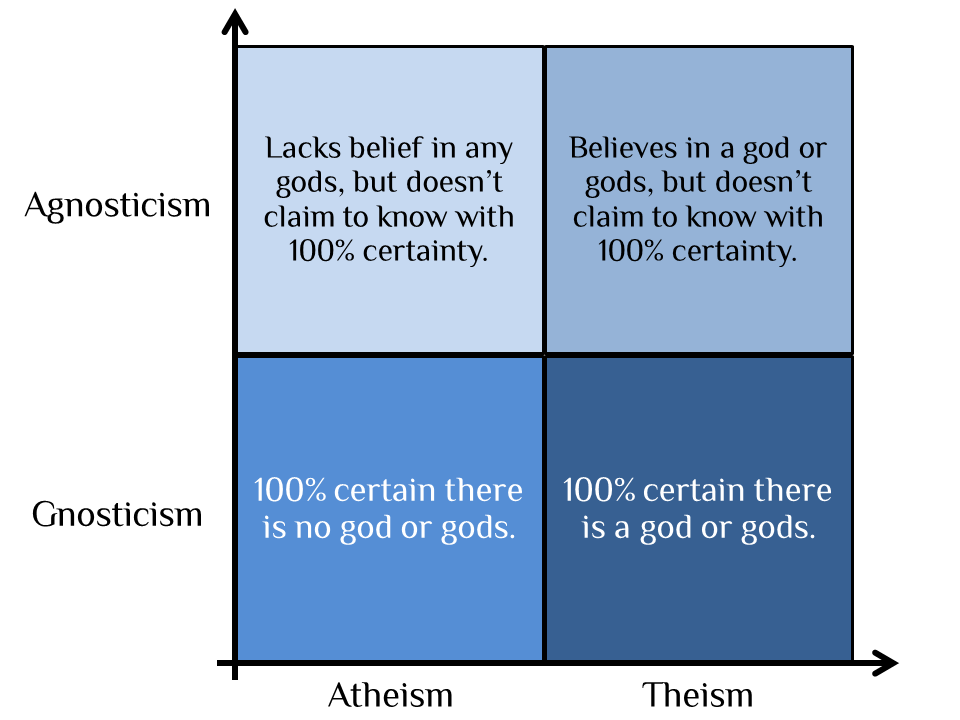The atheist position(s)
The most reasonable atheist position is the following position. They might say
"People say that some supernatural being exists, and they call this 'God.' Until they provide sufficient evidence for this claim, I choose not to accept the claim."
This position is often called weak atheism (contrasted with strong atheism), negative atheism (contrasted with positive atheism), or agnostic atheism (contrasted with gnostic atheism).
Weak/negative/agnostic atheism rejects the claim that a god exists because the claim is not sufficiently substantiated. Whereas strong/positive/gnostic atheism asserts the positive claim that god either does not exist or is unlikely to exist.
The burden of proof, skepticism, faith, and conclusive proof
In the case of weak atheism, the burden of proof truly is on the theist, and the atheist does not hold a faith-based position. This is not a "cop out" or "bias," it's just logical that this would have to be the case.
Most people accept this logic for other extraordinary claims. They typically don't believe in other gods such as Zeus or Thor, and to not accept these polytheistic claims isn't generally considered faith.
If I said that I had a gigantic firebreathing dragon in my basement, you wouldn't believe it unless I provided good evidence for it. Of course, if I simply said "I have a dog at home," you most likely would believe me. But that's because you have massive amounts of prior experience and evidence of people owning dogs that it seems totally reasonable and justified for you to believe me. If I said I owned a rocket-launcher at home, you might or might not believe me. This claim is a bit more "out there." It's certainly less common than owning a dog. You might be quite skeptical, but if I argued well I could possibly convince you that I had a rocketlauncher. I could also show you it, and you would be immediately convinced.
Also, if you accepted any claim without sufficient evidence, you would necessarily come to accept contradictory claims. People claim things all the time, and sometimes those claims come into conflict.
You say that "My assertion is that neither position can provide conclusive proof. Therefore both are on faith." However, this puts you in a (very unreasonable, in my opinion) position that everything is faith. This is not how science or epistemology works. In science, nothing is ever conclusively proven, it is rather somewhere on the spectrum of weakly substantiated by evidence to extremely well-substantiated by evidence. Scientific models are not "true", but are rather models that approximately explain some underlying reality. Newton's laws are not "true", but they are a very good approximation of reality. That I claim this is a good approximation is neither based on "faith" or "conclusively proven," but is rather a claim that is extremely well-substantiated by evidence. In fact, some models are even better than Newton's laws--the model championed by Einstein.
The (weak) atheist position is not that the god claim hasn't been "conclusively proven," but rather that it hasn't been sufficiently substantiated to justify accepting it. Therefore, they remain skeptical of this claim. They don't accept the claim until it is sufficiently substantiated by evidence.
Atheists as people
While the position held above can describe the word 'atheism,' in reality atheists are people. People who hold multiple beliefs, have behaviors, lifestyles, attitudes, and so on. There will also be trends among these. For example, while it isn't logically necessary to be an atheist, in reality atheists might be statistically more likely to believe in an earth older than 20,000 years old. They also might be more likely to be more socially liberal, which you may or may not find reasonable. Atheists in the United States are more likely to think that abortion is acceptable. You may or may not find this position reasonable. Perhaps you think they justify murdering helpless babies.
Atheists are also more likely to view religion as a bad thing, just as another example. Logically, there is nothing stopping religion from being a net social positive, even if god didn't exist. If they claim that religion is a bad thing, then this is an affirmative position and should be argued on its merits. Some atheists might argue more strongly that religion is a net negative (see e.g Richard Dawkins, Christopher Hitchens or Matt Dillahunty), whereas other atheists are more keen to argue that religion also has substantial social benefits (see e.g Jonathan Haidt or David Sloan Wilson).
I'm an atheist, but there are many beliefs that are more (statistically) commonly held by atheists (than, say, Christians in the United States) that I find (1) morally indefensible, and (2) scientifically and logically unreasonable. Yet I still hold the weak atheist position as described in the former sections, even though I might find a certain subsection of atheists as people to be generally unreasonable in other respects. Of course, there are also things that are more common among theists that I find unreasonable.

